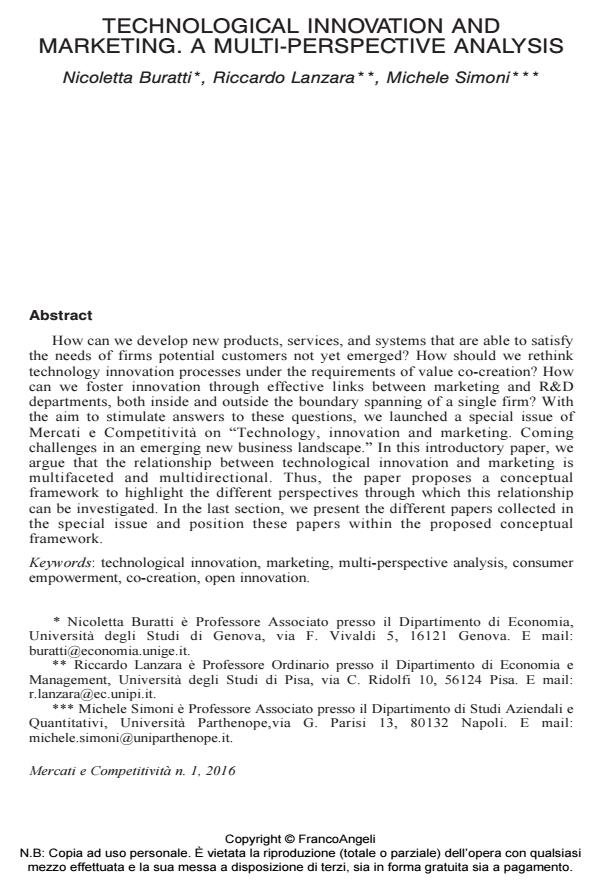Technological innovation and marketing. a multi-perspective analysis
Journal title MERCATI E COMPETITIVITÀ
Author/s Nicoletta Buratti, Riccardo Lanzara, Michele Simoni
Publishing Year 2016 Issue 2016/1
Language English Pages 26 P. 19-44 File size 198 KB
DOI 10.3280/MC2016-001003
DOI is like a bar code for intellectual property: to have more infomation
click here
Below, you can see the article first page
If you want to buy this article in PDF format, you can do it, following the instructions to buy download credits

FrancoAngeli is member of Publishers International Linking Association, Inc (PILA), a not-for-profit association which run the CrossRef service enabling links to and from online scholarly content.
How can we develop new products, services, and systems that are able to satisfy the needs of firms potential customers not yet emerged? How should we rethink technology innovation processes under the requirements of value co-creation? How can we foster innovation through effective links between marketing and R&D departments, both inside and outside the boundary spanning of a single firm? With the aim to stimulate answers to these questions, we launched a special issue of Mercati e Competitività on Technology, innovation and marketing. Coming challenges in an emerging new business landscape. In this introductory paper, we argue that the relationship between technological innovation and marketing is multifaceted and multidirectional. Thus, the paper proposes a conceptual framework to highlight the different perspectives through which this relationship can be investigated. In the last section, we present the different papers collected in the special issue and position these papers within the proposed conceptual framework.
Keywords: Technological innovation, marketing, multi-perspective analysis, consumer empowerment, co-creation, open innovation
- Advances in Panel Data Analysis in Applied Economic Research Angela Besana, Annamaria Esposito, pp.161 (ISBN:978-3-319-70054-0)
- R&D internationalization in asian developing countries: evidence from european multinationals Stefano Bresciani, Alberto Ferraris, Manlio Del Giudice, in MERCATI & COMPETITIVITÀ 3/2016 pp.25
DOI: 10.3280/MC2016-003003 - Advances in Applied Economic Research Angela Besana, Annamaria Esposito, pp.181 (ISBN:978-3-319-48453-2)
Nicoletta Buratti, Riccardo Lanzara, Michele Simoni, Technological innovation and marketing. a multi-perspective analysis in "MERCATI E COMPETITIVITÀ" 1/2016, pp 19-44, DOI: 10.3280/MC2016-001003